Overcoming ESL Summer School Challenges
A couple of years ago, I found myself teaching ESL summer school in Queens, NY. The program welcomed ESL kids from various schools in our district, presenting a unique challenge: preparing resources to meet the diverse needs of students just starting their English journey and those who had been in the U.S. for years.
As summer approaches, ESL educators like us often find themselves scrambling for ESL differentiated summer school materials to keep English Language Learners (ELLs) actively learning during these warm months. How can we support our ESL newcomers, push our beginners and intermediate ESL forward and enrich our advanced students, and on top of that beat the summer slump for those that do not attend summer school? It is truly a daunting task.
One way to achieve this, both now and throughout the school year, is to center instruction around themes. Thematic units of study immerse our multilingual learners in academic content centered on a specific theme, such as a beach theme.
To begin, they may engage in vocabulary-speaking games, such as 'I Have, Who Has,' during which they will learn or review summer nouns and verbs. They will also participate in summer-themed memory games and beach-themed sorts for nouns, verbs, and adjectives. Additionally, they will explore summer-related topics through scaffolded reading comprehension passages. Finally, they may practice writing scaffolded words, sentences, and paragraphs, all within the beach theme.
Importance of Teaching ESL Students in Themes
Research indicates that thematic units of study enhance ESL students' reading and writing skills by providing contextually rich learning experiences (Vogt, 2003). Themes serve as a scaffold for language acquisition, fostering meaningful connections between vocabulary, grammar, and real-world contexts.
1. ESL Vocabulary Speaking Games
Incorporating vocabulary games into ESL instruction adds an element of fun and interactivity while reinforcing language skills. Find some fun images of summer themed nouns and verbs and create I have who has Summer Nouns/ Verbs Game.
The "I Have, Who Has" game is an interactive vocabulary activity where students match cards that state "I have [word], who has [another word]?" This engaging game helps ESL learners practice and reinforce vocabulary through a fun and repetitive format. The summer-themed version focuses on nouns and verbs, making it a perfect fit for seasonal learning. Suitable for various proficiency levels, it encourages active participation and enhances language skills in an enjoyable way.This engages students in dynamic language practice, enhancing word recognition, comprehension, and retention.
2. ESL Grammar Games and Word Sorts: Nouns, Verbs, and Adjectives
Grammar instruction doesn't have to be boring. It can be made dynamic and engaging through ESL grammar games and word sorts. Focusing on key parts of speech such as nouns, verbs, and adjectives, students deepen their understanding of English grammar while participating in interactive learning activities. Research shows that gamification in ESL learning enhances student engagement, motivation, and retention of language skills (Viberg et al., 2018).
Memory Games: Enhance retention through engaging, repetitive play.
Matching Games: Strengthen word recognition and understanding.
Sorting Mats: Develop categorization skills by sorting nouns, verbs, and adjectives.
Color by Code: Reinforce part of speech knowledge with fun coloring activities.
3. ESL Writing Picture Prompts: Beach-Themed and Differentiated
Newcomer ESL Students: Cut, Match Labels, and Write
ESL Beginner Students: Word Banks, Images, and Sentence Starters/ Focus on Present Tense Verbs
ESL Intermediate Students: Writing Prompts with Word Banks, Images, and Sentence Starters, Focus on Past Simple Verbs
ESL Advanced Students: Writing Prompts with Images and Word Banks
All picture prompts build one cohesive narrative about a day at the beach, enhancing continuity and comprehension.
There are so many other ways you can use these stories. Here are just some examples:
4. Reinforce Grammar and Vocabulary with ESL Summer Themed Build a Sentence Activities
This interactive resource helps students practice Present Continuous, Simple Past, and “can” for ability using color-coded word and picture cards that make sentence building visual and accessible.
With included grammar anchor charts, recording sheets, and hands-on mats, learners can build sentences, create short stories, sort regular vs. irregular verbs, and more. Whether used as a center activity, bell ringer, or independent practice, this low-prep resource supports oral language, writing, and grammar—all while building confidence and keeping your ELLs engaged through the summer.
5. Incorporating Summer-Themed High-Interest Read-Alouds
Summer is the perfect time to re-engage multilingual learners (MLLs) and English language learners (ELLs) with content that’s fun, accessible, and rich in language development opportunities. But finding appropriate read-alouds for ESL students can be tough—especially ones that support vocabulary, grammar, and critical thinking in a structured way. That’s why the Sea Turtles Read-Aloud & Literacy Resource is a game-changer for summer school.
This all-in-one unit includes a full-color read-aloud book, printable student mini-booklets for annotation, and 12 differentiated activities designed specifically for language learners.
Students explore nonfiction content while practicing key academic skills like writing, vocabulary development, and comprehension—all through KWL charts, “See-Think-Wonder” routines, labeling diagrams, and scaffolded sentence-building tasks. With sentence stems, visual support, and options for multiple proficiency levels, this resource makes it easy to keep your ESL students learning in meaningful, age-appropriate ways all summer long.
6. Incorporating Summer-Themed ESL Nonfiction Research Projects
Pairing your read-alouds with engaging research projects is another powerful way to boost summer learning while developing core language skills. The ESL Ocean Animals Nonfiction Reading Research and Mini Writing Project offers a perfect follow-up or stand-alone unit that gets students excited about exploring ocean life—all while reading, writing, and researching in English.
Designed for grades 2–12, this resource includes differentiated reading passages on five high-interest animals—crabs, dolphins, fish, sharks, and seahorses—each provided at three reading levels. Visual aids, video links, sketch notes, and sound-based supports make this resource especially accessible for newcomers and intermediate learners alike.
Students organize their research using KWL charts, Can-Have-Are graphic organizers, and labeled diagrams, then apply what they’ve learned in a structured writing project using multi-level booklet templates.
This resource pairs seamlessly with the Sea Turtles Read-Aloud Pack, creating a cohesive summer learning theme that supports language development, content knowledge, and academic confidence.
7. Avoiding Summer Slump with ESL Summer Packs
To combat the summer learning slump, I like to provide my ESL students with opportunities to practice English at home through ESL Newcomer Summer Packet: Beach Themed. This comprehensive resource includes differentiated activities covering vocabulary, grammar, reading comprehension, writing, and assessment. It's designed to keep students engaged and motivated over the summer break.
Middle School/ High School Version
Teaching ESL students during summer school presents unique challenges, but it also offers an opportunity for innovation and growth. By incorporating thematic instruction, differentiated resources, and engaging activities, we can ensure that ESL students thrive in their language learning journey and avoid the summer slump.
Would you like more tips, trick and freebies?
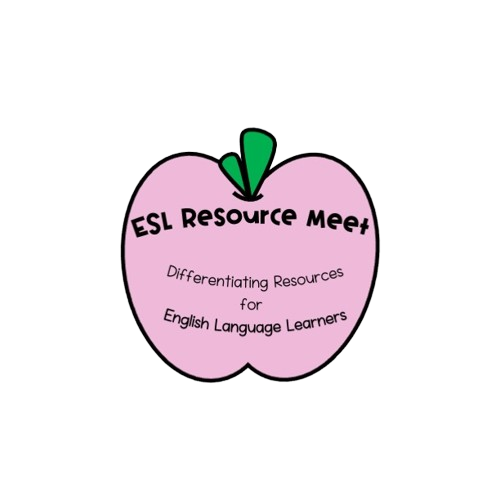

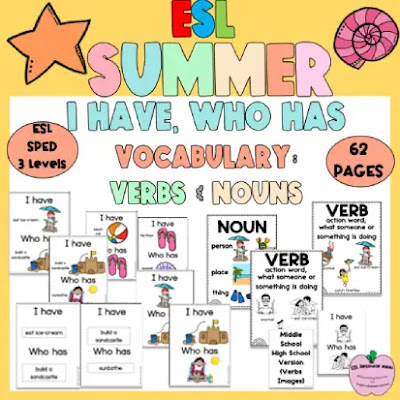












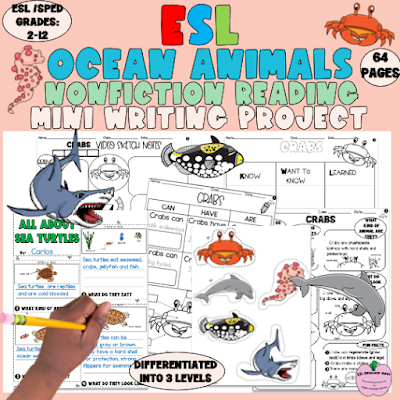


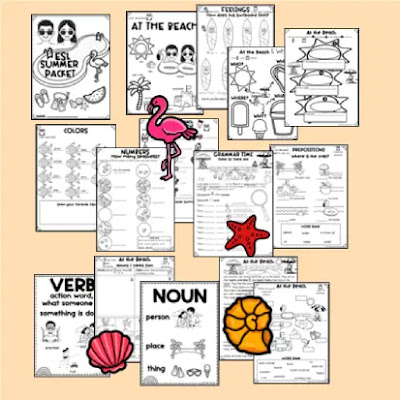









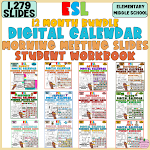





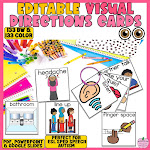




































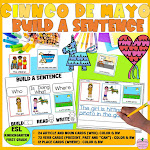







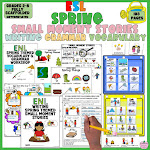




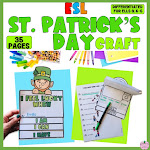
















































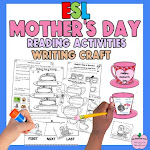
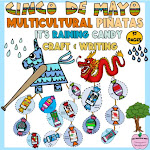
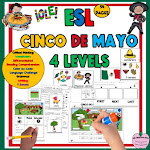
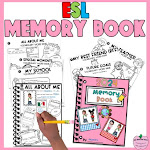








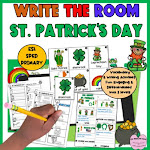

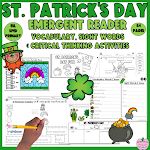



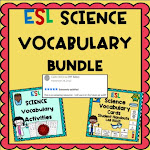






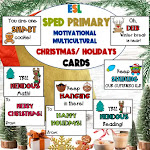



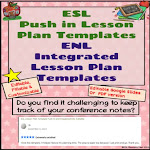




0 Comments